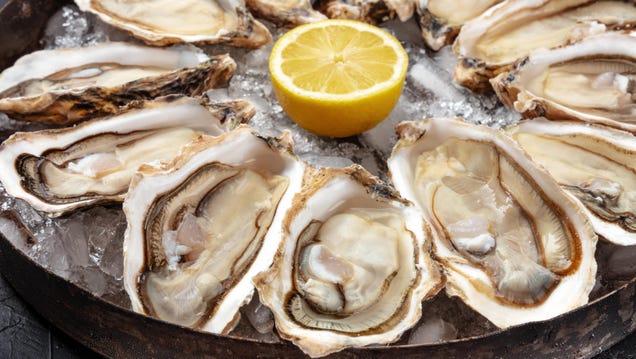You’ve probably seen headlines like this (“Raw Oysters Linked to Two Deaths”) at some point: It’s not the first time doctors have warned people about eating raw oysters. Oysters—like clams, mussels, scallops, sponges, krill, baleen whales, and others—are known as “filter feeders.” They feed by eating plankton and extracting nutrients from the water, and they are very good at it. Bivalves (the animal class oysters belong to) are high in protein, and have been a staple in our diet over the past 165,000 years. The problem arises when our planet’s climate changes, and the customs and systems in place that have been working in harmony turn deadly for us.
Is eating raw oysters becoming more dangerous?
As filter feeders, Oysters are the sponge of the ocean. When you eat them raw, you are spinning the wheel of fortune of ocean diseases that you can potentially catch on your next bite. A recent study from Nature found that cases of Vibrio vulnificus, a type of deadly bacteria that is found in oysters, have increased eightfold since 1988 in the Eastern U.S. due to warming seas, and the affected areas are quickly expanding. The same study estimates that cases of Vibrio will double between 2041 and 2060 at the rate our planet is warming. According to NASA, Vibrio bacteria thrive in warmer oceans, and with a warming planet, you can expect oysters to become more dangerous to eat, especially in warmer seasons.
According to the Centers for Disease Control and Prevention (CDC), about 80,000 people get infected with vibriosis, the illness caused from the Vibrio bacteria, and 100 die from it every year in the U.S. (including by getting it from open wounds in the ocean and other ways), making it the leading cause of death from seafood. The FDA reports that infection with one type of Vibrio, specifically Vibrio vulnificus, has a death rate of up to 50% in high-risk people. (For reference, COVID’s mortality rate estimate around the world was no higher than 5%.)
An oyster that contains the Vibrio bacteria will not look, smell, or taste differently. If you consume one, you can get a mild illness, including diarrhea and vomiting. In rare cases, you can get very sick and potentially die from bloodstream infections, severe skin blistering, or have your limbs amputated due to Vibrio vulnificus, according to the CDC.
You can still eat oysters—just cook them first
If you really love oysters, a sound middle ground is to cook the oyster. The CDC recommends you do one of the following:
- Boil for at least 3 minutes
- Fry in oil for at least 3 minutes at 190°C
- Broil 3 inches from heat for 3 minutes, or
- Bake at 230°C for 10 minutes
The CDC also has some general tips to prevent catching an infection when eating or handling shellfish or other seafood:
- Don’t eat raw or undercooked oysters or other shellfish. Fully cook them before eating, and only order fully cooked oysters at restaurants. Hot sauce and lemon juice don’t kill Vibrio bacteria, and neither does alcohol. Some oysters are treated for safety after they are harvested. This treatment can reduce levels of Vibrio in oysters, but it does not remove all harmful germs.
- Keep cooked seafood separate from raw seafood and its juices to avoid cross contamination.
- Wash your hands with soap and water after handling raw seafood.
- Stay out of salt water and brackish water if you have a wound (including from a recent surgery, piercing, or tattoo). Cover any wounds if they could touch raw seafood or raw seafood juices, or if you might come into contact with brackish or salt water.
- Wash open wounds and cuts thoroughly with soap and water if they came in contact with salt water, brackish water, raw seafood, or raw seafood juices or drippings.

Leave a Reply
You must be logged in to post a comment.